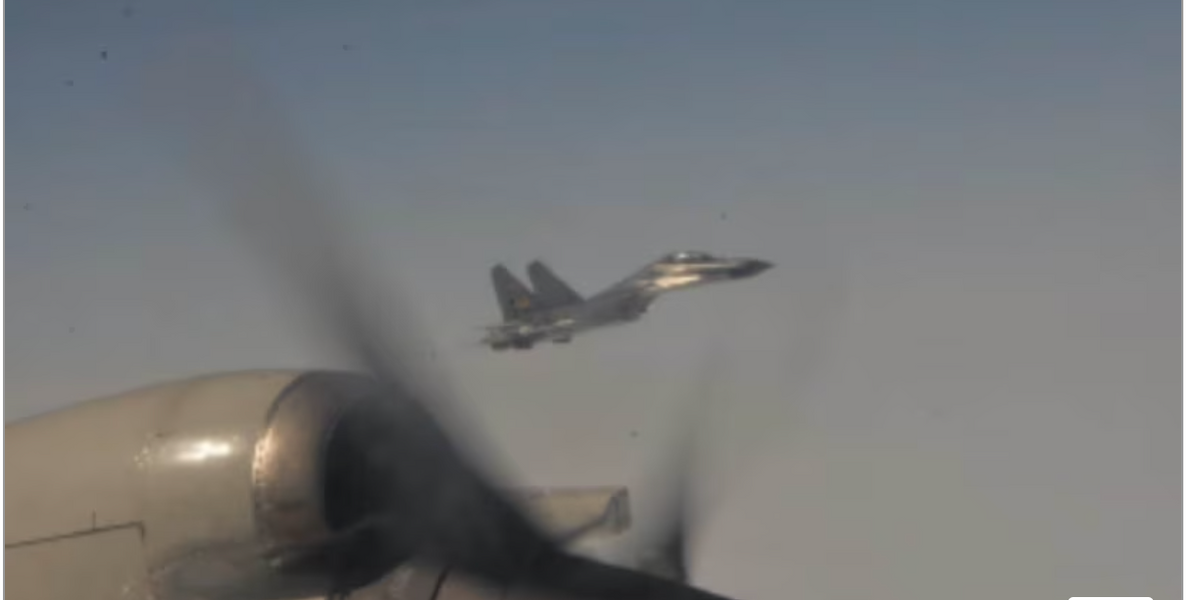A flurry of freshly released footage of apparent Chinese air interceptions further complicates the troubled U.S.-China relationship, casting an even larger pall on the upcoming summit between President Joe Biden and Chinese leader Xi Jinping in San Francisco.
The Pentagon has released a spate of photos and footage it says shows interceptions of U.S. military aircraft by Chinese pilots. "Since the fall of 2021, we have seen more than 180 such incidents: More in the past two years than in the decade before that," said Ely Ratner, the assistant secretary of defense for Indo-Pacific security affairs, in a Defense Department statement earlier this week.
"That's nearly 200 cases where PLA operators have performed reckless maneuvers, or discharged chaff, or shot off flares, or approached too rapidly or too close to U.S. aircraft,” Ratner added.
The images and videos were released in the run-up to the Defense Department’s upcoming annual report on China’s military power. And, they come amid continued efforts by the Biden administration to restore channels of military communications with China that were severed by Beijing after former House Speaker Nancy Pelosi’s 2022 visit to Taiwan — something referenced in the DOD press statement.
“As this is happening, Chinese military officials refuse repeated U.S. requests to open lines of communication between the two countries,” the Pentagon said, highlighting appeals by Navy Adm. John Aquilino, the commander of U.S. Indo-Pacific Command, to open back up. "I have yet to have one of those requests accepted," Aquilino said. "I look forward to speaking to my counterparts. I think developing that relationship would be critical to maintaining the peace and stability in the region."
The accent placed by the press release on the necessity of bilateral dialogue suggests that the intercept revelations may be partially intended as an attempt by the Biden administration to pressure Beijing into reopening those lines. Aerial interceptions, including those that involve close contact between aircraft belonging to different militaries, are not uncommon, but Ratner said there has been an alarming uptick in such activity since the fall of 2021.
The Pentagon’s concerns come even as officials make plans for a face-to-face meeting between Biden and Xi next month in San Francisco. The sit-down is unlikely to yield a substantial rapprochement between the U.S. and China or to result in the elusive reset in bilateral relations previously sought by the Biden administration. Instead, the meeting appears to be aimed more at establishing ground rules in the mounting global competition between Washington and Beijing and promoting mutual “stability,” a term frequently used by White House officials to describe the administration’s China policy.
The interception footage is the latest instance in ongoing attempts by both sides to enter the high-stakes talks between the world’s two largest economies from a position of strength. Xi met with Russian President Vladimir Putin, whom he described as his “dear friend,” earlier this week at Beijing’s Belt and Road Forum. The conference, which drew scores of participants from the global south, reflects China’s ongoing bid to position itself as a key voice on issues pertaining to the developing world and to advance a vision of multipolarity that is starkly at odds with Washington.
“Viewing others’ development as a threat or taking economic interdependence as a risk will not make one’s own life better or speed up one’s development,” said Xi in a thinly-veiled reference to the U.S. during his opening remarks.
More than setting the tone, the Pentagon’s framing of its interception claims may offer a preview of Biden’s agenda for the meeting. Top officials including Secretary of State Antony Blinken and Secretary of Defense Lloyd Austin have repeatedly and unsuccessfully urged Beijing to reopen lines of military communication. The Pentagon’s Tuesday statement suggests that reestablishing military dialogue will be one of Biden’s core objectives in the upcoming November summit.
China, for its part, appears to be using the military dialogue issue as leverage to extract concessions from Washington in other areas. “The U.S. side is surely aware of why there is difficulty in military-to-military exchanges,” Chinese Diplomat Yang Tao said following Blinken’s visit to China earlier this year. “One of the reasons is unilateral sanctions against the Chinese side. They first need to remove impediments and create conditions for military-to-military cooperation.”
Yet the White House is in no hurry to provide the concessions Beijing appears to be seeking, instead taking new steps to tighten the economic screws on China. The Biden administration unveiled updated export controls on Tuesday aimed at further restricting China’s access to certain types of semiconductors, the latest broadside in a widening chip war with China.
“These controls maintain our clear focus on military applications and confront the threats to our national security posed by the PRC government’s military-civil fusion strategy,” said U.S. secretary of commerce Gina Raimondo.
Each side has something the other wants, but it remains to be seen if even partial compromise is possible in the context of an increasingly hostile bilateral relationship. The November Biden-Xi summit, if it takes place, will be the biggest test yet of the administration’s effort to establish a working model of sustainable, managed competition with China.















